外研(新标准)版九年级下册Module3 Life now and then Unit2 I think life is better today课件(共29张PPT)
文档属性
| 名称 | 外研(新标准)版九年级下册Module3 Life now and then Unit2 I think life is better today课件(共29张PPT) | 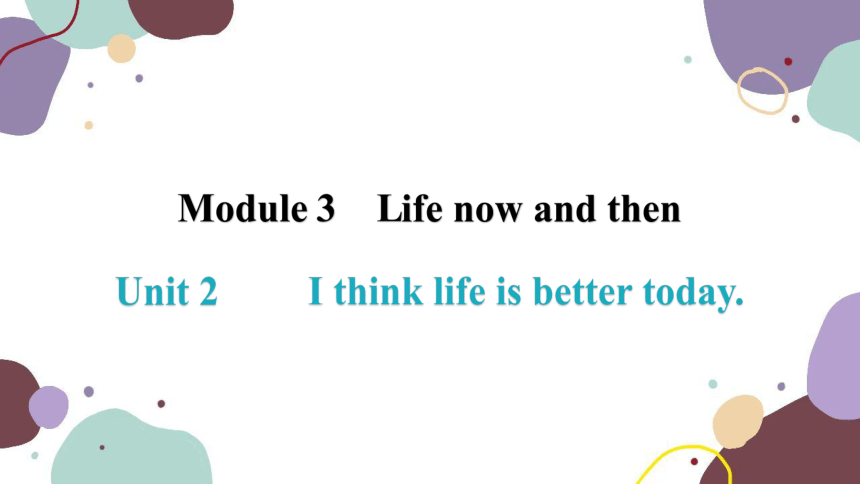 | |
| 格式 | pptx | ||
| 文件大小 | 316.5KB | ||
| 资源类型 | 教案 | ||
| 版本资源 | 外研版 | ||
| 科目 | 英语 | ||
| 更新时间 | 2023-06-23 20:56:54 | ||
图片预览

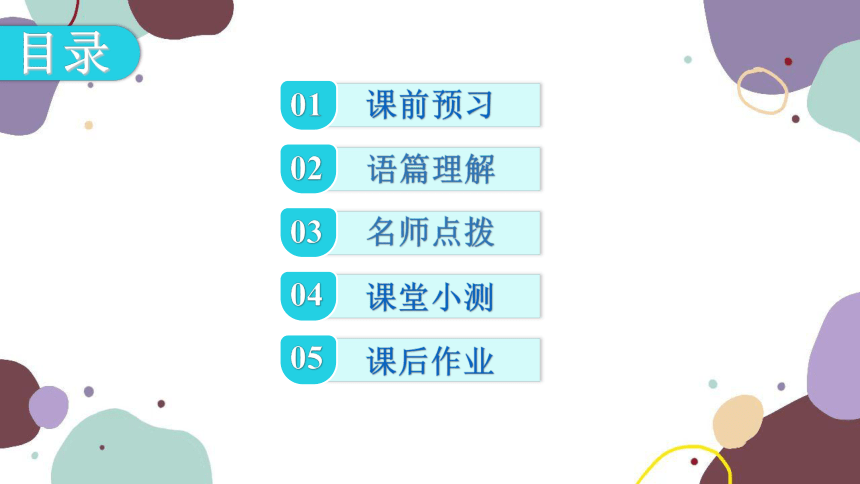
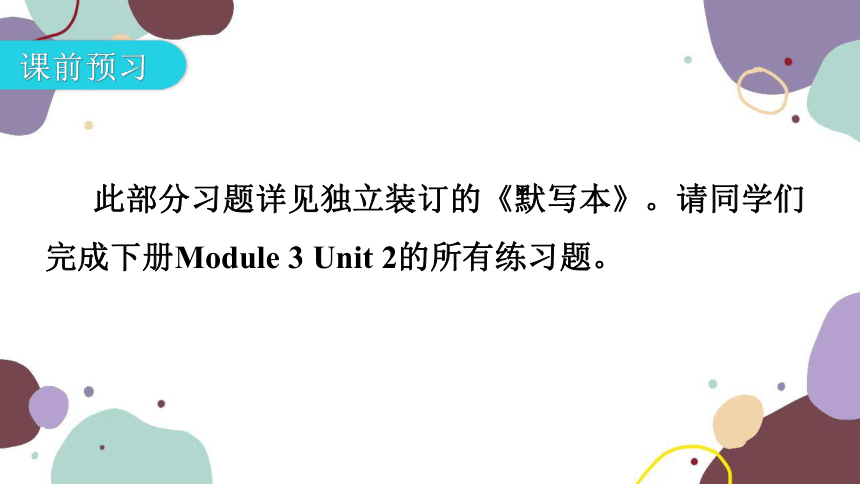
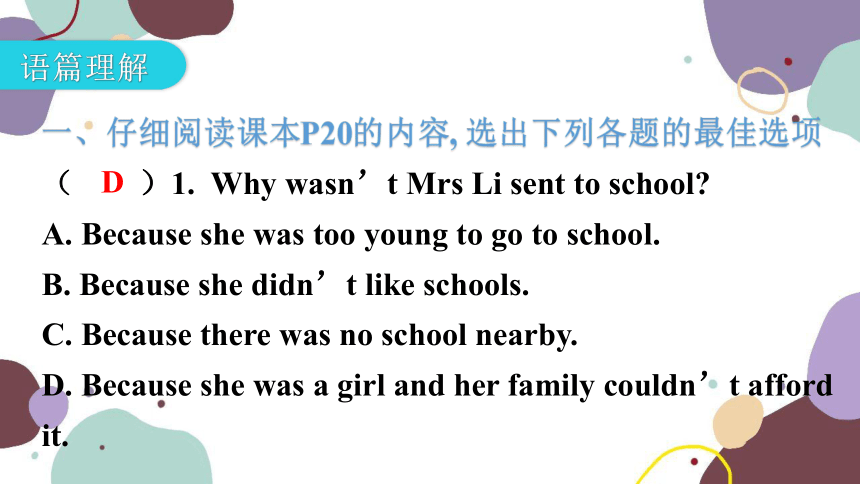
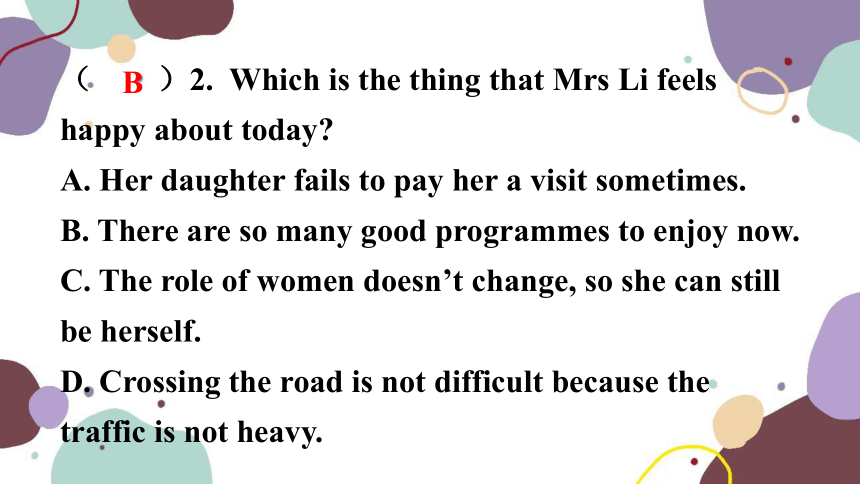
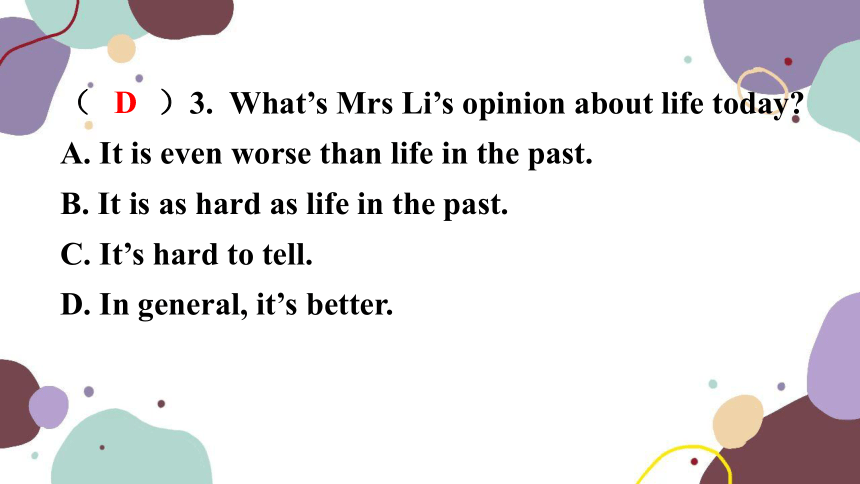
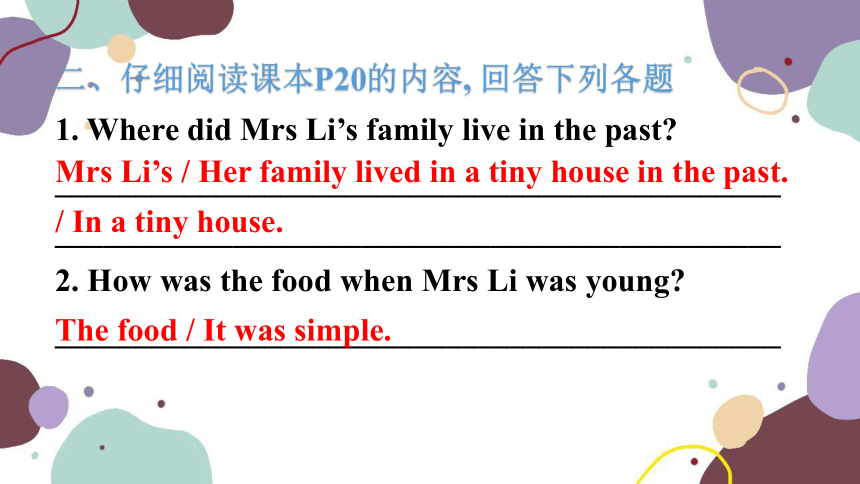
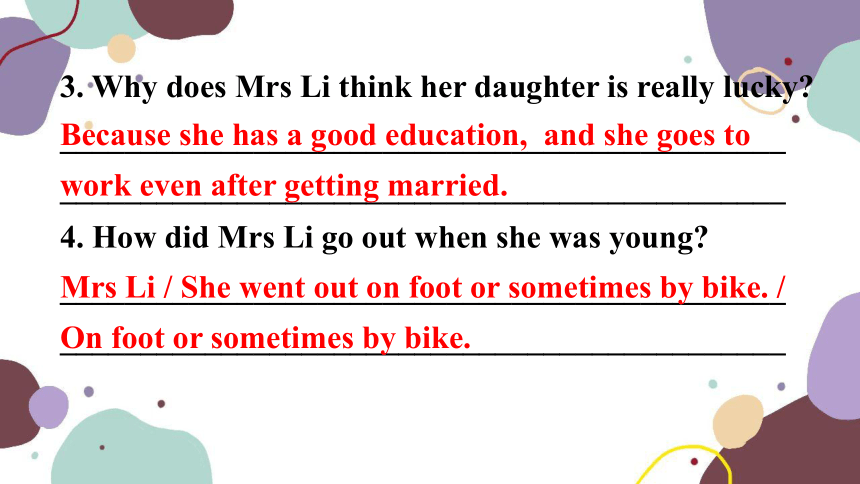
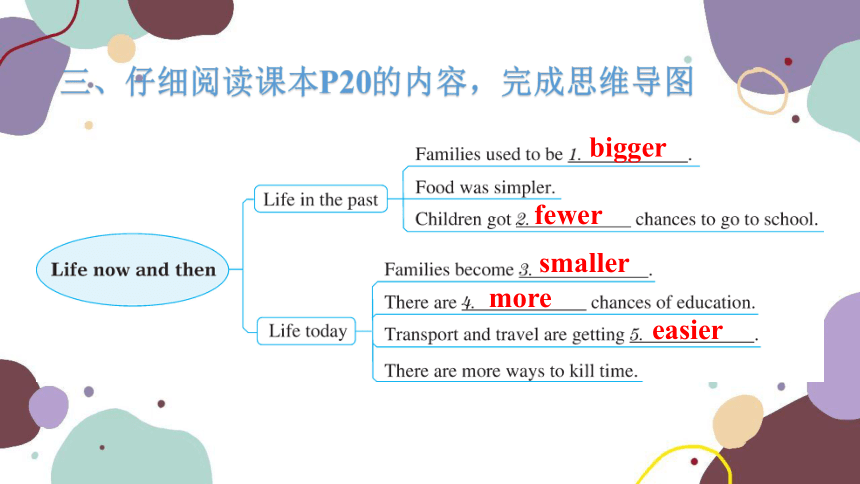
文档简介
(共29张PPT)
Module 3 Life now and then
Unit 2 I think life is better today.
目录
名师点拨
03
课堂小测
04
课后作业
05
01
课前预习
语篇理解
02
课前预习
此部分习题详见独立装订的《默写本》。请同学们完成下册Module 3 Unit 2的所有练习题。
语篇理解
一、仔细阅读课本P20的内容, 选出下列各题的最佳选项
( )1. Why wasn’t Mrs Li sent to school
A. Because she was too young to go to school.
B. Because she didn’t like schools.
C. Because there was no school nearby.
D. Because she was a girl and her family couldn’t afford it.
D
( )2. Which is the thing that Mrs Li feels happy about today
A. Her daughter fails to pay her a visit sometimes.
B. There are so many good programmes to enjoy now.
C. The role of women doesn’t change, so she can still be herself.
D. Crossing the road is not difficult because the traffic is not heavy.
B
( )3. What’s Mrs Li’s opinion about life today
A. It is even worse than life in the past.
B. It is as hard as life in the past.
C. It’s hard to tell.
D. In general, it’s better.
D
二、仔细阅读课本P20的内容, 回答下列各题
1. Where did Mrs Li’s family live in the past
__________________________________________________________________________________________
2. How was the food when Mrs Li was young
_____________________________________________
Mrs Li’s / Her family lived in a tiny house in the past. / In a tiny house.
The food / It was simple.
3. Why does Mrs Li think her daughter is really lucky
__________________________________________________________________________________________
4. How did Mrs Li go out when she was young
__________________________________________________________________________________________
Because she has a good education, and she goes to work even after getting married.
Mrs Li / She went out on foot or sometimes by bike. / On foot or sometimes by bike.
三、仔细阅读课本P20的内容,完成思维导图
bigger
fewer
smaller
more
easier
名师点拨
what’s more的用法
what’s more是固定词组, 常用作插入语, 表示强调,意为“此外;而且;更重要的是”, 相当于besides或in addition。如:
He studies very hard, and what’s more, he is ready to help others. 他学习非常刻苦, 而且他还乐于助人。
( )1. Bill hates Tony’s laziness, and _____, he thinks Tony is too naughty.
A. that is B. after all
C. what’s more D. what’s best
C
2. 更重要的是,他根本就不努力。 (根据汉语意思完成句子,每空一词)
__________ __________, he didn’t work hard at all.
What’s
more
busy 的用法
busy为形容词,意为“忙的;繁忙的”。其常见搭配为:be busy doing sth.忙于做某事,be busy with sth. 忙于某事。如:
He is busy preparing for the examination. 他忙着准备考试。
He is busy with some important work. 他正忙于一些重要的事情。
1. 萨莉现在正忙着照顾那个婴儿。
Sally is now busy __________ __________ __________ the baby.
2. 妈妈每天忙于家务。
Mum __________ __________ __________ housework every day.
根据汉语意思完成句子, 每空一词
taking
care
of
is
busy
with
课堂小测
一、用所给单词的适当形式填空
1. I live in a __________ (noise) neighbourhood. Many people and cars come and go very often.
2. That boy is the second __________ (tall) boy in my school.
3. His aunt got __________ (marry) last year.
noisy
tallest
married
4. It is one of the greatest __________ (role)she has played.
5. My elder sister has a good ______________(educate).
roles
education
二、单项填空
( )6. The experiment was _____ easier than we had expected.
A. more B. much more C. much
C
( )7. Since China has been a member of WTO, English is _____ useful than before.
A. more B. most C. much
( )8. Wei Hua runs _____ than Li Fang.
A. more slowlier B. much slowly
C. much more slowly
A
C
( )9. My uncle and his wife _____ for 25 years.
A. are married B. got married
C. have been married
( )10. Can you tell me which season do you like _____
A. well B. better C. best
C
C
三、阅读理解 (B篇)
What if our parents or grandparents can’t use the smartphone and the computer?What should we do?
Zhang Ming, a college graduate from Shandong, created a 9-page “WeChat guide(微信指南)” for his parents. With drawings and simple words, the step-by-step guide explains how to send messages, take pictures and make video calls. “My parents are getting old. They need an easy way to learn how to use new technology,” Zhang said.
Zhang’s experience is common nowadays. In the world, 40% of parents learn about new technology, including computers, mobile Internet and social media (社交媒体), from their children, according to a survey from the International Communication Association. Parents teach their kids almost everything when they are young. Now for the first time, the teachers become the students and the students become the teachers.
According to the China Internet Network Information Centre, in China, 56.7%of Internet users and 67.2% of social media users are under the age of 30. Young people usually act as a link between their family and the new environment. But when they teach their parents new technology, parents can connect to the new world by themselves.
( )11. What do we learn about the“WeChat guide” from the second paragraph
A. It has 19 pages.
B. It has only pictures in it.
C. It is created by Zhang Ming’s parents.
D. It explains how to send messages, take pictures and make video calls.
D
( )12. What does Paragraph 3 mainly talk about?
A. Parents always know more than their children.
B. Parents cannot connect to the new world on their own.
C. It’s common for children to help their parents learn to use new technology today.
D. Few young people in China nowadays help their parents learn about new technology.
C
( )13. What’s the percentage of social media users who are under the age of 30
A. 40%. B. 56.7%.
C. 67.2%. D. 80%.
C
( )14. What does the underlined word “link” in Paragraph 4 mean?
A. Bridge. B. Friend.
C. Book. D. Guide.
A
( )15. What can we infer from the passage
A. Most parents learn about new technology all over the world.
B. Young people can be their parents’ teachers in the age of new technology.
C. Zhang Ming created the“WeChat guide” in order to become famous.
D. Old people needn’t learn new technology.
B
课后作业
请同学们完成下册Module 3 Unit 2的所有练习题。
THANKS!
Module 3 Life now and then
Unit 2 I think life is better today.
目录
名师点拨
03
课堂小测
04
课后作业
05
01
课前预习
语篇理解
02
课前预习
此部分习题详见独立装订的《默写本》。请同学们完成下册Module 3 Unit 2的所有练习题。
语篇理解
一、仔细阅读课本P20的内容, 选出下列各题的最佳选项
( )1. Why wasn’t Mrs Li sent to school
A. Because she was too young to go to school.
B. Because she didn’t like schools.
C. Because there was no school nearby.
D. Because she was a girl and her family couldn’t afford it.
D
( )2. Which is the thing that Mrs Li feels happy about today
A. Her daughter fails to pay her a visit sometimes.
B. There are so many good programmes to enjoy now.
C. The role of women doesn’t change, so she can still be herself.
D. Crossing the road is not difficult because the traffic is not heavy.
B
( )3. What’s Mrs Li’s opinion about life today
A. It is even worse than life in the past.
B. It is as hard as life in the past.
C. It’s hard to tell.
D. In general, it’s better.
D
二、仔细阅读课本P20的内容, 回答下列各题
1. Where did Mrs Li’s family live in the past
__________________________________________________________________________________________
2. How was the food when Mrs Li was young
_____________________________________________
Mrs Li’s / Her family lived in a tiny house in the past. / In a tiny house.
The food / It was simple.
3. Why does Mrs Li think her daughter is really lucky
__________________________________________________________________________________________
4. How did Mrs Li go out when she was young
__________________________________________________________________________________________
Because she has a good education, and she goes to work even after getting married.
Mrs Li / She went out on foot or sometimes by bike. / On foot or sometimes by bike.
三、仔细阅读课本P20的内容,完成思维导图
bigger
fewer
smaller
more
easier
名师点拨
what’s more的用法
what’s more是固定词组, 常用作插入语, 表示强调,意为“此外;而且;更重要的是”, 相当于besides或in addition。如:
He studies very hard, and what’s more, he is ready to help others. 他学习非常刻苦, 而且他还乐于助人。
( )1. Bill hates Tony’s laziness, and _____, he thinks Tony is too naughty.
A. that is B. after all
C. what’s more D. what’s best
C
2. 更重要的是,他根本就不努力。 (根据汉语意思完成句子,每空一词)
__________ __________, he didn’t work hard at all.
What’s
more
busy 的用法
busy为形容词,意为“忙的;繁忙的”。其常见搭配为:be busy doing sth.忙于做某事,be busy with sth. 忙于某事。如:
He is busy preparing for the examination. 他忙着准备考试。
He is busy with some important work. 他正忙于一些重要的事情。
1. 萨莉现在正忙着照顾那个婴儿。
Sally is now busy __________ __________ __________ the baby.
2. 妈妈每天忙于家务。
Mum __________ __________ __________ housework every day.
根据汉语意思完成句子, 每空一词
taking
care
of
is
busy
with
课堂小测
一、用所给单词的适当形式填空
1. I live in a __________ (noise) neighbourhood. Many people and cars come and go very often.
2. That boy is the second __________ (tall) boy in my school.
3. His aunt got __________ (marry) last year.
noisy
tallest
married
4. It is one of the greatest __________ (role)she has played.
5. My elder sister has a good ______________(educate).
roles
education
二、单项填空
( )6. The experiment was _____ easier than we had expected.
A. more B. much more C. much
C
( )7. Since China has been a member of WTO, English is _____ useful than before.
A. more B. most C. much
( )8. Wei Hua runs _____ than Li Fang.
A. more slowlier B. much slowly
C. much more slowly
A
C
( )9. My uncle and his wife _____ for 25 years.
A. are married B. got married
C. have been married
( )10. Can you tell me which season do you like _____
A. well B. better C. best
C
C
三、阅读理解 (B篇)
What if our parents or grandparents can’t use the smartphone and the computer?What should we do?
Zhang Ming, a college graduate from Shandong, created a 9-page “WeChat guide(微信指南)” for his parents. With drawings and simple words, the step-by-step guide explains how to send messages, take pictures and make video calls. “My parents are getting old. They need an easy way to learn how to use new technology,” Zhang said.
Zhang’s experience is common nowadays. In the world, 40% of parents learn about new technology, including computers, mobile Internet and social media (社交媒体), from their children, according to a survey from the International Communication Association. Parents teach their kids almost everything when they are young. Now for the first time, the teachers become the students and the students become the teachers.
According to the China Internet Network Information Centre, in China, 56.7%of Internet users and 67.2% of social media users are under the age of 30. Young people usually act as a link between their family and the new environment. But when they teach their parents new technology, parents can connect to the new world by themselves.
( )11. What do we learn about the“WeChat guide” from the second paragraph
A. It has 19 pages.
B. It has only pictures in it.
C. It is created by Zhang Ming’s parents.
D. It explains how to send messages, take pictures and make video calls.
D
( )12. What does Paragraph 3 mainly talk about?
A. Parents always know more than their children.
B. Parents cannot connect to the new world on their own.
C. It’s common for children to help their parents learn to use new technology today.
D. Few young people in China nowadays help their parents learn about new technology.
C
( )13. What’s the percentage of social media users who are under the age of 30
A. 40%. B. 56.7%.
C. 67.2%. D. 80%.
C
( )14. What does the underlined word “link” in Paragraph 4 mean?
A. Bridge. B. Friend.
C. Book. D. Guide.
A
( )15. What can we infer from the passage
A. Most parents learn about new technology all over the world.
B. Young people can be their parents’ teachers in the age of new technology.
C. Zhang Ming created the“WeChat guide” in order to become famous.
D. Old people needn’t learn new technology.
B
课后作业
请同学们完成下册Module 3 Unit 2的所有练习题。
THANKS!
同课章节目录
- Module 1 Travel
- Unit 1 We toured the city by bus and by taxi
- Unit 2 It's a long story.
- Unit 3 Language in use
- Module 2 Education
- Unit 1 They don't sit in rows.
- Unit 2 What do I like best about school?
- Unit 3 Language in use
- Module 3 Life now and then
- Unit 1 They sometimes work harder.
- Unit 2 I think life is better today.
- Unit 3 Language in use.
- Module 4 Rules and suggestions
- Unit 1 You must be careful of falling stones.
- Unit 2 we must keep the camp clean.
- Unit 3 Language in use.
- Revison A
- Module 5 Look after yourself
- Unit 1 We'd better get you to hospital.
- Unit 2 Get off the sofa!
- Unit 3 Language in use.
- Module 6 Eating togethe
- Unit 1 When is the school-leavers' party?
- Unit 2 Knives and forks are used for most Western
- Unit 3 Language in use
- Module 7 English for you and me
- Unit 1 Have you ever been to an English corner?
- Unit 2 We all own English.
- Unit 3 Language in use
- Module 8 My future life
- Unit 1 Here's to our friendship and the future
- Unit 2 I know that you will be better at maths.
- Unit 3 Language in use
- Revison B
